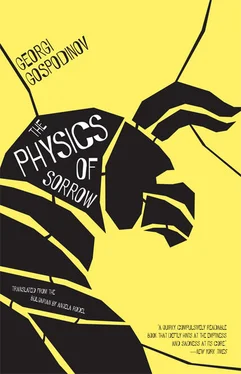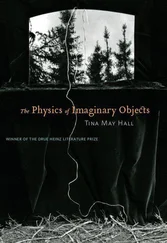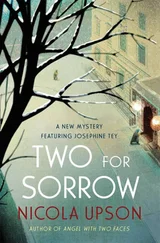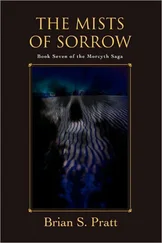THE GOOD MAN FLEES WHEN ONE PURSUES
A few years ago I had to get a new passport and take care of a few formalities at the town hall. I filled in my personal data — divorced, tall, college-educated. I turned in the form at the window, the woman compared it to the information she had in the computer, looked at me, and said coldly: “Why are you hiding a child?” This statement echoed loudly enough, I could sense how everyone filling out forms around me suddenly looked up, it even seemed that they drew back slightly. I myself stood there like someone caught at the scene of a crime. I’ve noticed that I can more easily make excuses for things I have done, but when I am accused of something that has never even crossed my mind, I freeze up, guilty. As the saying goes, the wicked man flees though no one pursues. However, for me the opposite was always truer: the good man flees when one pursues.
I kept silent longer than was probably acceptable before managing to utter that I have only one daughter. In that time — how unsure one is of his own innocence! — I calculated all my past relationships. I recalled one girlfriend who claimed to be pregnant every time we were on the verge of breaking up. You have a twelve-year-old son, the woman at the window announced unceremoniously. I stood there thunderstruck. All that was missing was for her to add “congratulations.” Can I see? I asked. She turned the monitor toward me and, thank God, it wasn’t me, just a case of identical names. The woman didn’t even apologize, turning around angrily in her chair, disappointed that I’d gotten away so easily. If she had known that I would spend the rest of the day going over in my mind all the women I had been with twelve years ago, even listing them by initials on a piece of paper, rating on a scale from 1 to 10 the potential risk of having a child I didn’t know about with each of them. If she had only known that, she would have been somewhat satisfied.
THE CELLAR OF THE STORY
But perhaps the story went like this.
March 1945. The war is coming to an end. A battle for a small Hungarian town, ferocious, the upper hand constantly changing, street by street. A Bulgarian soldier is seriously wounded and loses consciousness. His regiment is pushed back, the city remains temporarily (for a few days) in German hands. The soldier comes to in a cellar, lying on an old bed, above him stands the woman who has bandaged him up. She had managed to drag his body from the sidewalk straight through the little basement window, which is at street level.
She signals to him not to move, but he couldn’t even if he wanted to, he’s lost a lot of blood. In very bad German, the enemy’s language, he manages to exchange a few words with the Hungarian woman. Days go by, weeks, a month. Sometimes he loses consciousness, then wakes up again, still on the cusp between life and death. She continues bringing him food every day, applying compresses, changing his bandages. By the second month he has visibly improved, it’s clear that he’ll survive. The woman tells him that the little town is still in German hands and that the war has dragged on.
She lives alone, a widow, childless, she’s the same age as the soldier, around twenty-five. She falls in love with the wounded man. And because of him, she decides to change the entire course of the war. The Germans have not surrendered, they’ve come up with a secret weapon that has slowed everything down, the front has been pushed back east. Once she even fakes a search of the house. The man in the cellar only hears someone stomping the floor above him with roughshod boots and hurling the chairs to the ground, some containers fall, the sound of a broken dish. He grips his machine gun, ready to shoot the first ones to enter the cellar, but he remains undiscovered, thank God.
The closed space of that little room starts driving him mad. The sole small window has been boarded up with sheet metal. Through a single thin crack — good thing the sheet metal is bent — a bit of light gets in, just enough to distinguish day from night. He can’t stop tormenting himself with the question of how a practically finished, a practically won war could so suddenly change its course. And how long he will remain unnoticed by the Germans in this basement.
We should note that he, too, has secretly fallen in love with the woman taking care of him, but he does not yet want to admit it to himself. There, in his home country, he has a wife and child, who certainly think him dead. One night his rescuer stays with him, she merely touches his face and that is enough.
It was unexpected, as always happens after a long wait, they embraced, their breaths quickened, they uttered some fragmented words, passionate, tired, amorous, each in his own language. He didn’t understand any of that crazy Hungarian, she didn’t understand any of that crazy Bulgarian. Afterward silence fell, in which the two of them lay side by side. Languor and happiness on her part. Languor, happiness, and some unclear alarm (but clear guilt) on his. He tells her, in Bulgarian, that he has a wife and little boy, whom he left when the child was only a week old. Both to salve his conscience that he said it, yet also for her not to understand because it was in Bulgarian. He didn’t know that when it comes to understanding things they shouldn’t, women have another literacy altogether. The Hungarian woman got up suddenly and went upstairs. For several days he did not see her at all.
One afternoon a sudden blow smashed through the window of the cellar. The man leapt up — he always slept with his weapon by his side — and hid in the corner. The light pouring in stung his eyes. Soon a boy’s tousled head poked through the window. The man crouched behind a huge barrel. Only then did he see the heavy rag ball a meter away from him. The boy muttered something, crawled like a lizard through the narrow window and slipped inside. The man held his breath. The boy was so close that he could feel the warmth of his sweaty body. The boy grabbed the ball, tossed it through the window, pulled himself up on the ledge and wriggled out.
Along with dust and the scent of cat urine, the wind blew a scrap of an old newspaper through the window. And even though it was in Hungarian, he could still make out Hitler Kaput and see the photo of the Russian soldier raising a flag over the Reichstag.
He understood everything. He battered down the door and went up the stairs with his carbine. The light stung his eyes, and he hung on to the furniture as he walked. The woman was standing in front of him. She told him that he could shoot her or stay with her. She told him that she loved him and that they could live together, she also told him that he wouldn’t get very far with that rifle and his military uniform, that the world was no longer the same a whole month after the end of the war. Yes, it turned out that it was already June. She spoke softly, mixing Hungarian and German. He, mixing German and Bulgarian, replied that she was his savior and without her he would now be rotting on the Hungarian steppe. He also said that he would like to live with her until the end of his days (that was in Bulgarian), but that he had to go back to his son, who by now must be more than six months old, but that even if he tried, he would never be able to forget her. And both of them knew that once they parted, they would never see each other again. And that if they embraced now, they would never let each other go. Fortunately for his son, who was nine months old, each of them swallowed back their desires. In the end, they just said awkwardly: well, okay then, farewell. She filled him a backpack with whatever there was to eat and burst into tears only when the bell above the front gate jingled behind him.
The town of H. and his village in Bulgaria were separated by exactly 965 kilometers and two borders. He walked only at night, first, so as not to meet people, and second, because during the day his eyes continued to ache terribly from the light. He walked back along the same route he had trod with his regiment half a year earlier. He hid in abandoned shacks, burned out villages, he slept by day in old foxholes, trenches, and pits dug by bombs. In the end he had decided to leave his weapon and uniform with the Hungarian woman, so as not to attract attention. She had given him a real knitted sweater — this June happened to be cold and rainy — and a good hunting jacket with lots of pockets, left over from her late husband. And so, without a weapon, without epaulets or ID papers, he retraced the path of the war, always heading east, hiding from everyone. On the thirty-fourth day, in the middle of July, he reached his village. He waited until midnight and slipped like a thief into his own home. His parents were sleeping on the second floor, his wife and son were most likely downstairs, in the room next to the shed. This scene of recognition is clear. Fear, horror, and joy all in one. The dead husband returns. Here he was already proclaimed a fallen hero, awarded some small medal, his name had even been chiseled into the hastily erected memorial on the village square, alongside the names of his fellow villagers who had died to liberate the homeland. His reappearance, like all resurrections, only upset the normal course of life.
Читать дальше












